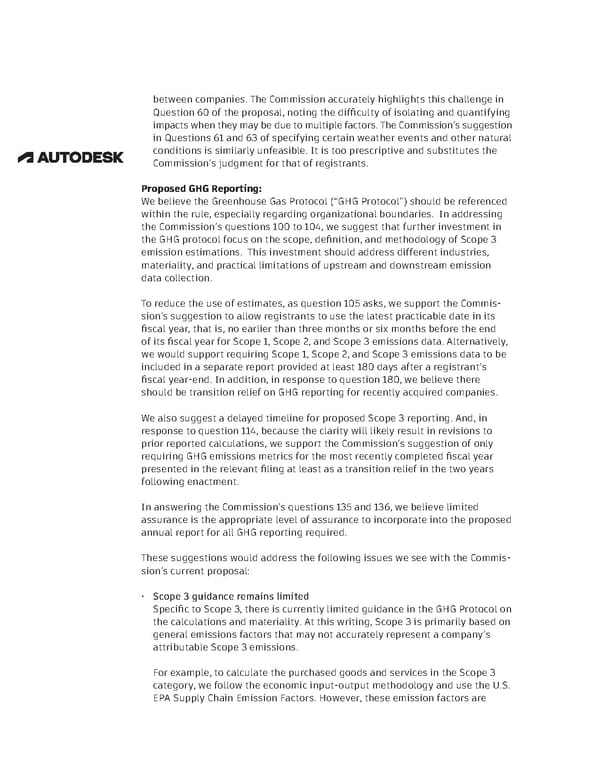between companies. The Commission accurately highlights this challenge in Question 60 of the proposal, noting the difficulty of isolating and quantifying impacts when they may be due to multiple factors. The Commission’s suggestion in Questions 61 and 63 of specifying certain weather events and other natural conditions is similarly unfeasible. It is too prescriptive and substitutes the Commission’s judgment for that of registrants. Proposed GHG Reporting: We believe the Greenhouse Gas Protocol (“GHG Protocol”) should be referenced within the rule, especially regarding organizational boundaries. In addressing the Commission’s questions 100 to 104, we suggest that further investment in the GHG protocol focus on the scope, definition, and methodology of Scope 3 emission estimations. This investment should address different industries, materiality, and practical limitations of upstream and downstream emission data collection. To reduce the use of estimates, as question 105 asks, we support the Commis- sion’s suggestion to allow registrants to use the latest practicable date in its fiscal year, that is, no earlier than three months or six months before the end of its fiscal year for Scope 1, Scope 2, and Scope 3 emissions data. Alternatively, we would support requiring Scope 1, Scope 2, and Scope 3 emissions data to be included in a separate report provided at least 180 days after a registrant’s fiscal year-end. In addition, in response to question 180, we believe there should be transition relief on GHG reporting for recently acquired companies. We also suggest a delayed timeline for proposed Scope 3 reporting. And, in response to question 114, because the clarity will likely result in revisions to prior reported calculations, we support the Commission’s suggestion of only requiring GHG emissions metrics for the most recently completed fiscal year presented in the relevant filing at least as a transition relief in the two years following enactment. In answering the Commission’s questions 135 and 136, we believe limited assurance is the appropriate level of assurance to incorporate into the proposed annual report for all GHG reporting required. These suggestions would address the following issues we see with the Commis- sion’s current proposal: • Scope 3 guidance remains limited Specific to Scope 3, there is currently limited guidance in the GHG Protocol on the calculations and materiality. At this writing, Scope 3 is primarily based on general emissions factors that may not accurately represent a company’s attributable Scope 3 emissions. For example, to calculate the purchased goods and services in the Scope 3 category, we follow the economic input-output methodology and use the U.S. EPA Supply Chain Emission Factors. However, these emission factors are --.:I AUTODESK
 Autodesk Report Page 3 Page 5
Autodesk Report Page 3 Page 5